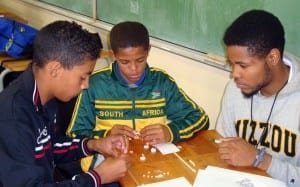The Engineering Council of South Africa (ECSA), Gauteng Department of Infrastructure Development (GDID) and the University of Johannesburg (UJ), have signed a Memorandum of Understanding which is aimed at supporting and coaching the engineering students at the UJ, who are recipients of the GDID bursaries.
This tripartite initiative comes after the GDID articulated the need to mentor first and second year students, since the majority fail to complete their qualifications as they are unprepared for the level of academic commitment required when studying engineering. This has been linked back to the need for stronger life skills support, and ECSA, as the custodian of the engineering profession in South Africa, has designed the pilot model for the support of students in partnership with both the GDID and UJ. Professor Angina Parekh, Deputy Academic Vice-Chancellor at UJ emphasised that the success of a student’s first year determines whether they are likely to stay within a tertiary institutions system. “The UJ has introduced a national First Year Experience (FYE) programme, as a student’s overall success is linked to how well they adjust academically and socially within the university environment,” she said. This FYE has increased the success rate for students to 83%.Member of the Executive Council of the GDID, Nandi Mayathula-Khoza, acknowledged the partnership by indicating that it marks an important milestone in addressing the broader needs of the province.
“The GDID is committed to creating and sustaining partnerships with universities in the province as it provides an opportunity to actively support the first year students through life skills training, mentoring and coaching in study techniques,” she explained. Cyril Gamede, President of ECSA pointed that this initiative allows ECSA to play a significant role in the social development in South Africa. Sipho Madonsela, CEO of ECSA, added to this by indicating that the launch marks a proudly South African moment and that the, “Pipeline Model, used in this programme is modelled according to the Thuthuka Model, founded by the South African Institute of Chartered Accountants (SAICA) has proven to be very effective.”






